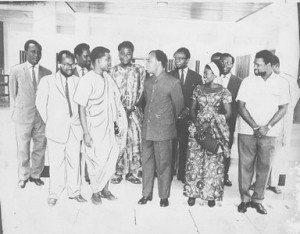
President Kwame Nkrumah and the Ghana Association of Journalists. Ghana under Nkrumah's Convention People's Party government published numerous revolutionary newspapers and journals. Ghana Television was first directed by Shirley Graham DuBois., a photo by Pan-African News Wire File Photos on Flickr.
Journalists mark World Press Freedom Day
Friday, 04 May 2012 00:00
Herald Reporters
ZIMBABWEAN journalists yesterday joined the rest of the world in commemorating World Press Freedom Day amid calls for improved working conditions. There were also calls for the media to report responsibly while exercising freedom of the Press.
The Zimbabwe Media Commission, publishers and editors converged in the capital to commemorate the event under the theme: “Media Freedom: Helping to Transform Societies through Ethical and Professional Reporting.”
The Zimbabwe Union of Journalists marked the day under the theme “Journalists Against Sexual Harassment.”
ZMC chairman Mr Godfrey Majonga said his commission was worried with the low salaries paid to journalists, especially in small media organisations and freelance reporters.
Addressing delegates, who included chief executives and editors of local media organisations, Mr Majonga said poor remuneration compromised journalists’ coverage of stories.
“Some of the salaries are a real insult to this esteemed profession of journalism,” Mr Majonga said.
“Once journalists are lowly-paid, they become professionally compromised. The results will be there for us to see. The issue of freebies, free transport and other goodies extended to individual journalists to cover certain events of some organisations really compromises what the journalists would write about.
“We need to provide journalists with their tools of the trade and resources that help them discharge their duties without being compromised.”
Mr Majonga bemoaned operational challenges facing the media industry, among them the price of newsprint and duty levied on it.
He said there was too much media concentration in major cities while marginalising rural communities.
Media, Information and Publicity Minister Webster Shamu urged media representative organisations to regulate media organisations’ activities to avoid State interference.
He said media reforms introduced since 2007 were premised on promises and claims by media associations and activists that they would put their house in order by exercising more and better professional responsibility in exchange for the relaxation of direct State control.
As the country heads for the next harmonised elections, Minister Shamu said, the people expected the media to develop and enforce professional rules and standards that protected customers from injury and abuse with little or no Government involvement.
“If the last five years of change do not show the media industry and the journalism professional to have fulfilled their promises, then the sovereign people of Zimbabwe have no option but to intervene and protect themselves through the instruments of the State, that is to revert to the regulatory regime of 2001-2007,” Minister Shamu said.
He said the Access to Information and Protection of Privacy Act provided for editors to publish apologies, provide retractions and afford complainants space for rebuttals of wrong or incorrect stories without the involvement of the State or ZMC.
“But how many of you have in the last four years seen such apologies, retractions, corrections or rebuttals being readily provided through agreements between editors and their aggrieved readers?
“What we have witnessed is a disturbing tendency for the editors to immediately resort to their lawyers to intimidate complainants and force them to give up their complaints,” Minister Shamu said.
Zimpapers group chief executive officer Mr Justin Mutasa said media organisations were expected to operate under the confines of the law adding that there was no absolute Press freedom in the world.
He said absolute Press freedom could not be achieved because media organisations sometimes abused the freedom.
“The Rupert Murdoch scandal illustrates my point why the Press should not have 100 percent Press freedom, hacking my phone and bribing the police. That scandal has clearly demonstrated the hypocrisy from people who want to teach us about Press freedom.
Mr Mutasa said there was need for media organisations to define what national interests were so that they could be guided by them.
ZMC also launched its strategic plan for 2010 to 2015 with the objectives of upholding and developing Press freedom. At the ZUJ commemoration, there was a launch of a campaign against sexual harassment.
Women Affairs, Gender and Community Development Minister Olivia Muchena launched the campaign against sexual harassment in the media.
In a speech read on her behalf by the Ministry’s Secretary Dr Sylvia Utete-Masango, Minister Muchena said there was need to name and shame perpetrators of sexual abuse in newsrooms.
“I would like to encourage each and every journalist to speak out on issues of abuse and sexual harassment. Let us name and shame for it is the only way we can address it,” she said.
Other speakers included Deputy Minister for Women’s Affairs Ms Jessie Majome, police public relations officer Superintendent Jessie Banda, labour movement representatives and ZUJ secretary-general Foster Dongozi.
No comments:
Post a Comment